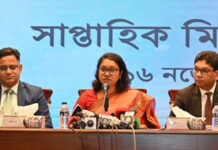 Mohammadi Group managing director Rubana Huq is all set to be elected first female president of Bangladesh Garment Manufacturers and Exporters Association (BGMEA) as her panel swept the election on Saturday bagging all the posts.
Mohammadi Group managing director Rubana Huq is all set to be elected first female president of Bangladesh Garment Manufacturers and Exporters Association (BGMEA) as her panel swept the election on Saturday bagging all the posts.
Rubana, also wife of former Dhaka North City Corporation mayor Annisul Huq, bagged 966 votes in the election.
The other elected directors are SM Mannan, Faisal Samad, Mohammad Nasir, Asif Ibrahim, Arshad Jamal, MA Rahim, KM Rafiqul Islam, Md Shahidul Haque, Moshiul Azam, Enamul Haque Khan, Masud Quader, Iqbal Hamid Quraishi, Nasir Uddin, Kamal Uddin, Sajjadur Rahman Mridha, Rezwan Selim, Munir Hossain, AKM Badiul Alam, Miran Ali, Mohammad Abdul Momen, Mosharraf Hossain Dhali, Shihab Ud Doja Chowdhury, Mohiuddin Rubel, Sharif Zahir and Nazrul Islam.
Those elected unopposed are AM Chowdhury Selim, Anjan Shekhar Das, AM Mahbub Chowdhury, Mohammad Atique, Mohammed Abdus Salam, Mohammed Meraj-E-Mostafa, Enamul Aziz Chowdhury, Mohammed Musa and Khondaker Belayet Hossain.
Voting in the election for 26 out total 35 posts was held at the BGMEA offices in the capital and Chattogram from 8:00am to 4:00pm when a total of 1,492 voters — 1,204 in Dhaka and 288 in Chattogram — exercised their franchise.
The BGMEA board of directors consists of 35 directors. Nine of them have already been elected unopposed from the Chattogram zone.
Two panels — Rubana-led Sammilita Forum and Design and Source Limited MD Jahangir Alam-led Swadhinata Parishad — contested the election against 26 posts.
For the Dhaka zone, Swadhinata Parishad panel contested for 18 posts while Sammilita Forum vied for all the 26 posts.
The elected directors will elect president, a first vice-president, a senior vice-president and five vice-presidents on 18 April.
While talking to reporters after casting her vote, Rubana said she would work cordially for the apparel sector if she became president of the organisation.
The current board under Md Siddiqur Rahman’s leadership took over for a two-year term on 22 September, 2015.
However, the board remained in office for more than three and a half years as the government extended its tenure thrice.
Source: Prothom Alo.









